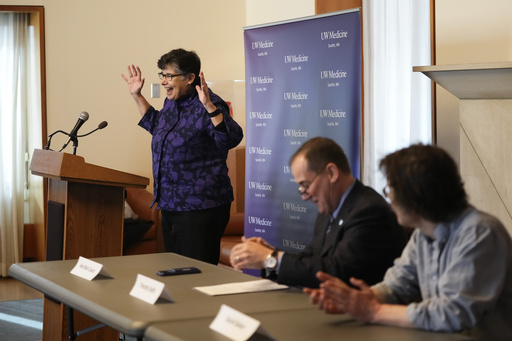LONDON — On Wednesday, the Nobel Prize in Chemistry was awarded to three prominent scientists for their groundbreaking methods in decoding and even designing new proteins, which are fundamental components of life. Their innovative work integrates advanced technologies, particularly artificial intelligence, and has the potential to significantly alter the future of drug development and production of new materials.
The prize was conferred upon David Baker, a biochemist from the University of Washington in Seattle, alongside Demis Hassabis and John Jumper, both computer scientists affiliated with Google DeepMind, an artificial intelligence research lab based in London. Heiner Linke, the chair of the Nobel Committee for Chemistry, highlighted that the award celebrated research that addressed “a grand challenge in chemistry, particularly in biochemistry, for many years.”
What prompted the 2024 Nobel Prize in Chemistry? Proteins are intricate molecules composed of thousands of atoms, intricately arranged in diverse shapes that dictate their biological roles. For years, scientists have aspired to efficiently create and construct new proteins. Since the 1990s, Baker has developed a computer program known as Rosetta, which analyzes extensive databases of existing proteins to assist in the design of entirely new proteins that do not naturally exist.
Johan Åqvist of the Nobel committee remarked, “With this technology, it seems like you can almost create any type of protein.” Meanwhile, Hassabis and Jumper unveiled an AI model capable of predicting the structures of nearly all 200 million known proteins discovered by researchers. Linke noted that the duo effectively “cracked the code,” making it possible, through skilled AI application, to forecast the complex structures of virtually any known protein.
Why is this research significant? The ability to tailor-make new proteins and gain deeper insights into existing ones could pave the way for the creation of cutting-edge medicines and vaccines. Additionally, Baker mentioned that it could facilitate the design of novel enzymes capable of breaking down plastics and other pollutants, offering solutions for reducing waste. “The prospects for developing smarter medicines that only act at the right moment in the body are remarkable,” Baker affirmed.
He cited the example of a potential nasal spray aimed at controlling the spread of specific viruses, such as COVID-19, and a treatment meant to mitigate symptoms from a cytokine storm. Jon Lorsch, a director at the National Institutes of Health, expressed that understanding how protein sequences fold into specific structures could lead to the design of unprecedented protein sequences useful for various applications.
How did the winners respond to the news? Baker discovered he was a Nobel laureate in the early morning hours with his wife, whose ecstatic reaction added to the excitement. He explained, “It was a little deafening.” Hassabis described having a typical morning at home until he received the call, explaining that the committee initially contacted his wife before finally reaching him. Jumper, reflecting on the moment, expressed, “It’s so incredible. It’s so unreal at this moment. And it’s wonderful.”
The role of artificial intelligence in this advancement cannot be understated. As a key figure in tech, Hassabis co-founded DeepMind in 2010, which was acquired by Google in 2014. The lab had previously made headlines for creating an AI that triumphed over a world champion in the complex game of Go. Traditionally, researchers spent extensive amounts of time decoding protein structures; however, the AI model AlphaFold developed by DeepMind can produce accurate predictions of protein structures within seconds or minutes, greatly expediting the research process.
Baker noted that the contributions of Hassabis and Jumper significantly boosted his team’s efforts, emphasizing how their AI innovations underscored the immense potential of such technology in protein design. Jumper remarked on the accelerated pace of scientific progress enabled by AI, recognizing it as a demonstration of how AI is revolutionizing scientific inquiry. In a related note, Geoffrey Hinton, often referred to as the “godfather of AI,” previously won the Nobel Physics Prize this year, highlighting the interconnected growth of artificial intelligence research.
This year’s chemistry laureates embody a new generation addressing complex scientific challenges through AI, according to Michael Kearns, a computer scientist at the University of Pennsylvania. Baker received half of the prize money totaling 11 million Swedish Kronor (approximately $1 million), while Hassabis and Jumper shared the remaining amount. The Nobel announcements commenced with the medicine prize awarded to Victor Ambros and Gary Ruvkun on Monday, followed by the Nobel Physics Prize being awarded to Hinton and John Hopfield. Upcoming Nobel categories include literature, peace, and economics through mid-October.
The funds for the awards originate from a legacy left by Alfred Nobel, the inventor behind the Nobel Prizes. The laureates are set to receive their accolades at the ceremonies scheduled for December 10, marking the anniversary of Nobel’s passing.




